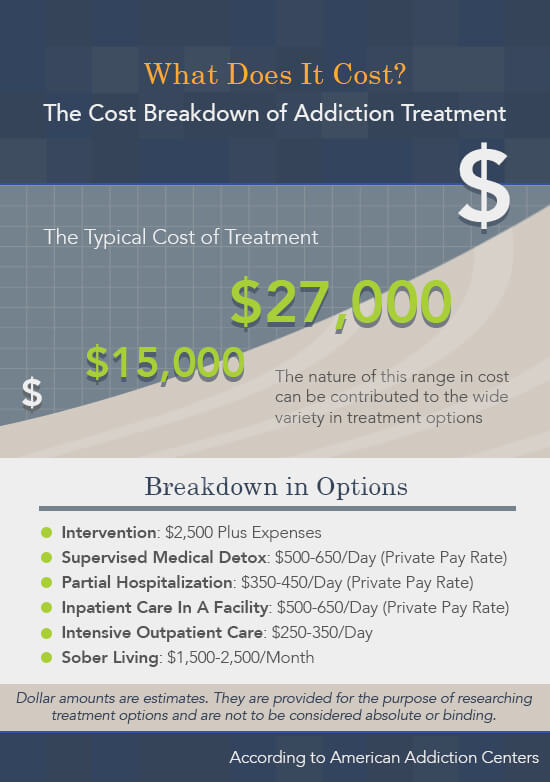How Much Does Alcohol Rehab Cost?
The cost of alcohol rehab programs vary, depending on the services required.
About 17.6 million people in the United States, which equates to one adult in every 12, have an alcohol abuse or dependence issue, according to the National Council on Alcoholism and Drug Dependence.

The issue develops due to a complex interplay between genetics, environment, and opportunity, and sometimes, it develops so slowly that the progression is difficult to see.
One quick drink with coworkers turns into three or four drinks before bed. A sip with dinner becomes a sip with lunch. And then it morphs into the need to sip alcohol at breakfast. Sometimes, people feel as though they need to drink all the time, or else they feel physically ill with cravings.
Every person with alcoholism has a personal story to share. No two people with alcoholism are exactly alike. In fact, in a study in the Journal of Studies on Alcohol and Drugs, researchers suggest that there are four different subtypes of alcoholism.1 They vary depending on when they appear, how serious the symptoms are, and how they should be treated.
While alcoholism types, and people who have alcoholism, can be very different, there is one thing that remains the same: People who have alcoholism will need treatment in order to recover. Since these people have different disease paths, they will need different types of treatment programs, and these treatments come with varying price tags.
Here is how costs typically break down for different components that may or may not be part of an alcoholism treatment program.
Take Our “Am I an Alcoholic?” Self-Assessment
Take our free, 5-minute “Am I an Alcoholic?” self-assessment below if you think you or someone you love might be struggling with an alcohol use disorder (AUD). The evaluation consists of 11 yes or no questions that are intended to be used as an informational tool to assess the severity and probability of an AUD. The test is free, confidential, and no personal information is needed to receive the result.
Types of Alcohol Rehabilitation Programs
There are several different types of alcohol rehabilitation programs that are available to individuals seeking help to overcome addiction to alcohol. The pros and cons of each alcohol rehab center should be thoroughly evaluated, and the program that best meets the needs of the individual and their specific condition should be selected.
Individuals also suffering from mental illness should look for alcohol rehab centers that offer dual diagnosis treatment. These specialized programs will treat alcohol addiction while also addressing any co-occurring mental conditions.
The most intense forms of treatment are offered through residential programs, which provide around-the-clock care but require moving into the alcohol rehab center and staying for the duration of treatment (typically 30-90 days).
A common form of long-term residential treatment is the therapeutic community, a self-supporting and democratically run residence that supports abstinence and recovery from alcohol use through planned lengths of stay that are often between 6-12 months.2 Members of the staff also usually reside within the community, and according to some surveys, more than half of therapeutic community staff members are in recovery.3
In contrast to residential treatment, outpatient alcohol rehab programs are designed to allow individuals to live at home while they receive treatment. This minimizes the interference to daily responsibilities involving work, school, and family.
What is an Intervention?

Some people with alcoholism are aware of the disease and the dangers it can cause. But some people with alcoholism remain convinced that the disease is not serious, or that it can be handled through willpower and strength. These people may need a conversation about addiction and its consequences before they will agree to get treatment. That conversation is known as an intervention.
Some families hold this talk informally, sitting down as a group without preparation or outside support. But some families hire outside help, so they can both understand what alcoholism is and how to persuade the person to get care. These families may incur costs as they plan.
A flat fee for an intervention may be between $2,500 and $10,000. But there are other expenses the family might be asked to pay, including costs for room and board for the person running the intervention. If the professional running the alcohol intervention is asked to transport the person to care after the talk is through, there may be more costs involved.
What is Medical Detox?
Sometimes, the damage from persistent alcohol abuse can linger long after the last drink has been ingested. Medical detox programs combine medical therapies with physical support, so people can get sober without falling ill and/or resorting to a return to alcohol use and abuse.
As part of medical detox programs, teams look for signs of complicated withdrawal, which the U.S. National Library of Medicine suggests can be characterized by:4
- Agitation
- Seizures
- Hallucinations
- Confusion
If and when they appear, the proper therapies are provided to alleviate the distress. Once the program is complete, the person is escorted to some form of rehab to continue the healing process.
Families choosing to pay for detox out of pocket might be expected to pay between $500-650 per day, and programs can last for several days.
How Much is Residential Care for Alcoholism?

This form of rehab is designed for people who cannot avoid the temptation to drink when they are living in the community. Many people find that temptation too difficult to avoid.
In a residential program, people move into a facility to get care for addiction, and that facility provides no access to alcohol. In a program like this, people have around-the-clock access to treatment teams that can help. To some, that can be a help that is well worth the price.
Unfortunately, the price for this kind of care can be rather high. Charges for medications, therapy, food, and housing can all add up rather quickly, making this one of the most expensive rehab options available.
Families hoping to pay out of pocket for this service can expect to pay $500-650 per day, and most programs last for weeks.
How Much is Outpatient Care for Alcoholism?
This form of treatment is designed to help people deal with an alcoholism issue while they continue to live at home and attend to their everyday duties. Someone in a program like this might get therapy for hours each week, but there may be no physical monitoring involved, and there may be no need for fees involving room and board.
These programs can seem like a bargain, as families might need to pay just $250-350 per day.
Some families mitigate this worry by using outpatient care as a last step. Once people move through residential and/or hospitalization programs, they then utilize outpatient care. This could be a good idea for people who want to keep costs down while keeping the chances of success up.
What Impacts the Cost of Rehab?
Various factors can influence the ultimate total cost of attending a drug and alcohol rehabilitation center. For example, the particular behavioral health provider can impact the overall price of rehab, as well as the length of time that someone spends in their rehabilitation center. Other factors can also influence the cost of rehab, such as their level of care and whether someone attends outpatient or inpatient rehabilitation with their provider.
How to Afford Treatment
There are various ways to afford paying for treatment at your chosen rehabilitation center. One of the most common methods of affording substance abuse treatment includes health insurance. However, if you don’t have behavioral health insurance benefits, you still have plenty of other payment options. For example, you can pay for rehab through payment plans and loans. You also have the option to attend a free rehabilitation center or state-funded rehabilitation center.
Alcohol Treatment Aftercare

At the end of a formal treatment program, some people need assistance with skills associated with sobriety, and they might need continued outpatient assistance with a mental health provider. Some programs can assist with this service, but some refer people to local providers, and costs can vary dramatically.
In addition to using aftercare counseling, some people lean on support groups like Alcoholics Anonymous. According to AA World Services, these groups are not run by mental health professionals, so services involving diagnosis and/or therapy are not provided. But the opportunity to discuss addiction openly, and learn from people who have worked on their alcoholism issues, could be useful for some people as they work on their addictions.

The Benefits of Care
While addiction care can be costly, the benefits can be plentiful. For example, in a study in the journal Addiction, researchers found that people who got formal care for an alcoholism issue were more likely to be sober three years later, when compared to people who attempted recovery without outside help.5 Clearly, the costs associated with care can be worth it, if they can deliver results like this. See some alcohol recovery stories from real people.
Investing in health is never wasteful. In therapy, you can tap into a team that will work to understand how your alcoholism developed, and what you will need to do with your alcoholism, so you will have yet more control in the future. With that newfound strength, you could pull together the life you always wanted. You could get that big promotion or pay off your debt. You could avoid late penalties on your bills, and you’ll save money by simply not buying alcohol. In short, your expenses could be paid back quickly, but that investment is required to get the process started. Are you inspired to change?
Sources
- Journal of Studies on Alcohol and Drugs. (1940). Drinking trajectories from adolescence to the mid-forties among alcohol dependent males.
- National Institute on Drug Abuse. (2015). What Are Therapeutic Communities?
- Dye, M.H., Roman, P.M., Knudsen, H.K., & Johnson, J.A. (2012). The availability of integrated care in a national sample of therapeutic communities. The Journal of Behavioral Health Services and Research, 39(1), 17-27.
- Medlineplus.gov. (2021). Alcohol Withdrawal.
- Moos, R. H., & Moos, B. S. (2006). Rates and predictors of relapse after natural and treated remission from alcohol use disorders.
